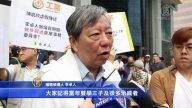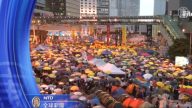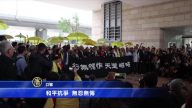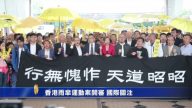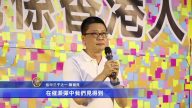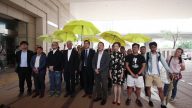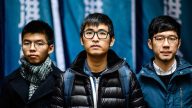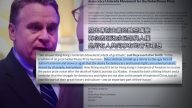【新唐人2014年10月30日讯】持续一个多月的香港民主运动,其和平理性、整洁以及民众的高素质表现,全球有目共睹。然而,面对香港政府的《民情报告》,何时会写都仍是未知数时,雨伞下的抗议民众又该如何做呢?有香港学者表示,这将是一个长期的抗争。
根据英国广播公司《BBC》报导,有香港学者认为运动已经进退维谷,暂时看不到政府跟学联有再次对话的空间;也有充当“中间人”的学者呼吁学联撤退,认为撤退不代表运动失败。
香港科技大学社会科学部讲座教授,兼中国跨国关系研究中心主任崔大伟认为,学生对于争民主,应该从长计议。
香港科技大学教授崔大伟:“他们应该知道,可能这次结束了、走了,再过半年,假如没有什么变化,没有什么好的商量,他们又可以出来,假如他们不走,后来就有警察出来打他们,这个对他们也没有好处,对香港没有什么好处。他们应该做思想准备,这个要求是一个长期的斗争,可能10年20年。”
另一方面,“占中”发起人,陈建民与戴耀廷已经重回工作岗位,恢复教学。他们强调为了运动可以延续下去,必须做出一些调整。但他们不会放弃民主,课余时间他们会与大家共进退。
他们认为,争取香港市民的民心,是整个运动重要的一环,仍然希望社会运动能让人觉醒,这次的占领主因是由于特区政府不顾民意而来。
香港科技大学教授崔大伟:“在香港,支持民主的人占55-60%,包括学生,包括中产阶级,包括大学毕业的老百姓很多人都支持民主,学生应该考虑,怎么把那个运动改变,改为一个比较长期存在的组织,这样他们需要再一次发动学生或参与者。”
学联秘书长周永康表示,有关运动的转型,可以考虑推动罢工罢市和罢课,以及将抗争思想扩展至社区,但强调最切实可行的退场方法,还是要看政府回应。
香港立法会议员 何俊仁:“香港政府是没有什么实权,全权都是在北京那一边,从这个四中全会结束以来,我们感觉不到北京会有什么软化的一些表示,所以现在还是在一个僵局之中。”
10月28号,香港学联在公开信中说,如果要想让谈话取得成果,香港政府应该递交一份报告给中共,反映香港人对自由选举的要求。如果不这样做的话,抗议领袖将要求会见中共总理李克强。
香港科技大学教授崔大伟:“中央不会让步,这个很清楚。所以他们应该考虑怎么用其他的要求其他的方式,假如中央要更多限制香港的民主,还有很多人可以出来,我们看每年七月一号,有几十万人出来了,每年都是这样,所以这个已经告诉中央,香港人希望香港的民主可以往前走,也不能越来越限制这个民主,这个信息已经很清楚。”
10月28号,雨伞运动届满一个月,香港金钟广场一朵朵伞花,成千上万的香港市民,争民主的抗议者,默哀87秒,纪念警方向市民发放催泪弹。
学联秘书长周永康:“我想每一个人都对香港未来的政改都感到悲观,因此我们才站出来抗争。”
香港市民:“这个月所发生的事情比任何电影和戏剧都更具戏剧性,我想没有人会想到政府会这样对待我们。”
著名影后叶德娴出现在集会上,坦言自己属于老一辈,在狮子山下长大的人,但今天山下已面目全非。
香港演员叶德娴:今日在狮子山下见到有许多高楼大厦,看起来好像很好一样,但为何有这么多人出来呢!因为这个只是美好的表面,我们要的是真的,我们要的是真普选。
这场“雨伞运动”已经成为1997年主权交接以来,中共对香港主权面临的最大挑战。
采访/秦雪 编辑/黄亿美 后制/李智远
Hong Kong Scholars: Umbrella Movement A Long-term Fight
The Hong Kong pro-democracy movement has lasted for over
a month, the world has witnessed that the protesters are
peaceful and tidy with a high-quality performance.
However, it is still unknown when the Hong Kong government
will send a report to Beijing, explaining the protesters’
dissatisfaction with the election plans.
What should the protesters do next?
Some Hong Kong scholars say that this will
be a long-term fight.
The BBC reported that some Hong Kong scholars observe
that the protest has been in a dilemma.
They currently cannot see room for dialogue again
between the students and the government.
Some scholars urge the students to go home, because going
home doesn’t mean the pro-democracy movement is defeated.
David Zweig, Professor at Hong Kong University
of Science and Technology says that
the students pro-democracy movement
should have a long-term plan.
David Zweig: They should know if they leave now,
after six months, if there are still no changes,
no doubt, they will come back again.
If they don’t leave now, the police will beat them, which is
not good for them and not good for Hong Kong either.
They should be thinking about their quest being a long-term
fight, which may be last for 10 or 20 years.
Co-founders of Occupy Central Chan Kin-man and Benny Tai
had returned to work, resuming their teaching jobs.
They stressed that the protest can carry on,
but need some adjustment.
They stressed that they will never give up on democracy.
After work, they can join the protest.
They say that to win Hong Kong citizens’ trust is the
important step during the entire movement.
They still hope the protest can awaken the people.
The Occupy Central was caused by the Hong Kong government
for ignoring citizens’ opinions.
David Zweig: In 1635, 55 to 60 percent of people support
democracy in Hong Kong.
It included students, political and business classes.
It also included many university graduated citizens.
The students should consider how to adjust the protest,
changing it to a long-term plan, so they need to encourage
the students and participants to hold a protest again.
Alex Chow, Secretary-general of the Hong Kong Federation
of Students said that regarding the adjustment of the
movement, it should consider to push forward workers, shops
and students strike.
As well as extending the pro-democracy thoughts
to the communities.
He stresses that the initial idea of ending the protest is
up to the government’s response.
Albert Ho, member of the Legislative Council of Hong Kong:
The Hong Kong government has no real power,
the real power is in Beijing.
Since the conclusion of the fourth Plenary Sessions,
we hadn’t see any soft signal from Beijing,
so we are still in a deadlock with no solution.
On Oct. 28, the Hong Kong Federation of Students issued
an open letter.
It stated that in order to obtain a result of dialogue, the
Hong Kong government should send a report to Beijing
explaining the Hongkongers wish to have free
elections in 2017.
Otherwise leaders of protest ask for direct talks
with the Chinese Prime Minister Li Keqiang.
David Zweig: Beijing will not make a concession, protesters
should consider the other way.
If Beijing wants to narrow down more democracy in
Hong Kong, many people will step out.
Every year on June 1 and July 1, tens of thousands of
Hongkongers will join the protest.
It happens every year.
So the messages had been sent to Beijing that the Hongkongers
hope to push their democracy forward, but not restrict it.
The messages are very clear.
On Oct. 28, the umbrella movement has lasted more than
one month, hundreds of thousands of pro-democracy protesters
held umbrellas in Admiralty Square and kept silent for
87 seconds, the length of time the police used to fire tear gas.
Alex Chow: I think everybody’s pessimistic towards the
political reform for Hong Kong in the future.
Hong Kong citizen: This month was more dramatic than
any drama or any movie.
I think no one would expect the government to
treat us in this way…
Hong Kong actress Deanie Ip appeared at the rally, she said
that she belonged to the old generation, growing up in
Lion Rock, however, today, the mountain was unrecognizable.
Deanie Ip: today there are many sky high buildings under the
Lion Rock, it seems very nice.
However, why do so many people take to the street?
Because the nicety is only on the surface,
we need real elections!
A genuine democratic election!
The umbrella movement has become the biggest challenge facing
the Chinese Communist Party in Hong Kong since
the handover in 1997.
Interview/QinXue Edit/Huang Yimei Post-Production/Li Zhiyuan


